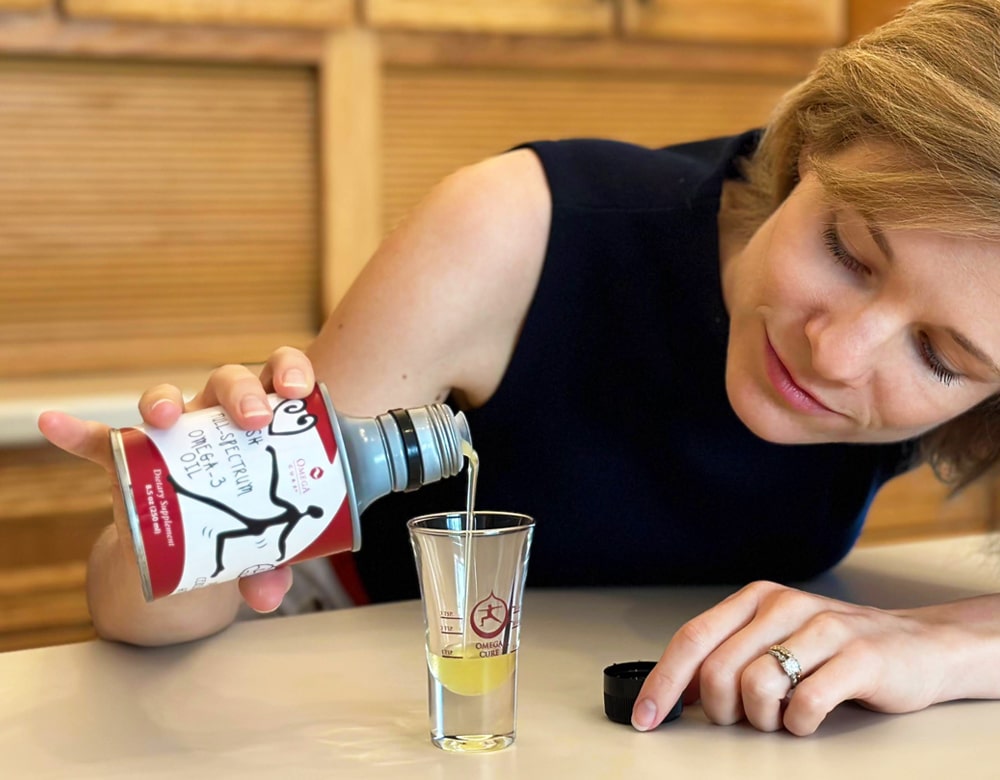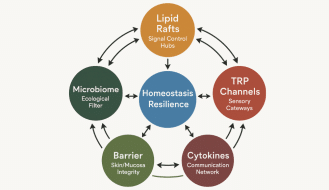Can Omega-3s Help Prevent Sunburns and Skin Cancer?
It’s that time of year again. The time when we fling off our winter clothes and wiggle into skimpy bathing suits. The time when we picnic, swim, and expose large areas of naked skin in the effort to amp up our vitamin D intake. And yes, it’s the time of year when we say hello to the heaviest doses of ultraviolet light as we enjoy our sunny outdoor activities.
Over the last 50 years, Americans have significantly increased their exposure to UV light. Experts say the depletion of the ozone layer may be partly to blame, but we’ve also done our part by traveling to sunny holiday locations and cultivating a fresh summer glow in and out of season (1).
We’ve been instructed to cover up, avoid the midday rays, and slather on sunscreen. Despite these warnings, the incidence of skin cancer is still on the rise. In fact, skin cancer is the most common form of cancer today (2).
Recently, researchers have posited that what we eat may also play a role in protecting our skin from ultraviolet light injury — particularly (you guessed it) omega-3 fatty acids.
How Do Omega-3s Help Protect the Skin?
Looking at how omega-3 works in the body, there are several explanations for why omega-3 molecules could help protect the skin from sun damage:
~ Omega-3 helps change the flexibility and fluidity of the cell membrane. As noted in our previous blog, omega-3 makes up an important part of the cell membrane and helps promote the exchange of nutrients in the cell. This is good for the skin because the cells are the producers of the active components and nutrients of the skin tissue. In other words, the better the cells function, the healthier the skin tissue will be.
~ Omega-3 helps regulate skin inflammation. If you expose your skin to too much sunlight, you risk getting a sunburn — one of the primary risk factors for skin cancer. In medical terms, a sunburn is an inflammatory reaction, characterized by redness, swelling, and ultimately a flaking off of the top layer of dead cells. Since omega-3 molecules help prevent inflammation and play a role in shutting down ongoing inflammatory processes, they can help reduce the tendency to sunburn.
Since omega-3s help prevent inflammation and shut down ongoing inflammatory processes, they are important for reducing the tendency to sunburn.
Omega-3 and Skin Cancer Research
Numerous studies and reviews also show that when people increase their omega-3 intake, they experience an added protective benefit.
To give you just two examples:
One double-blind 2003 study funded by the European Commission, Environment & Climate Programme demonstrated that when the subjects were given 4 grams of EPA daily, they saw a reduction in early cancer markers, such as sunburns. The researchers theorized that long-term, EPA omega-3 supplementation might help reduce skin cancer in humans (3).
A more recent double-blind study using 5 grams of omega-3 also compared the effect of fish oil supplementation to placebo. For the 79 people who participated in the study, immunosuppression was 50% lower in people who took the omega-3 and were exposed to 8 and 15 minutes of sun, compared with people who received placebo (4).
How Do Different Types of Omega-3 Fatty Acids Affect Skin Health?
It is also important to note which kinds of omega-3 are being discussed in these studies. There are various types of omega-3s, including EPA, DHA, and ALA molecules. For skin research, the main focus to date has been on the EPA omega-3 variety.
Generally speaking, Americans have low levels of long-chained EPA and DHA polyunsaturated fatty acids in their skin. And if you are a strict vegetarian, the amounts of long chained PUFAs — found primarily in fatty fish — will likely be even lower. While some of the ALA omega-3 found in vegetable sources like flaxseed oil and walnuts convert to the long-chained EPA molecules, the conversion rate is slow and limited in mammals. Only between 0.2% to 8% of plasma ALA converts to EPA (5). How often you visit a fast food restaurant or eat processed foods (which are often rich in pro-inflammatory omega-6s) will also influence this conversion rate.
So what’s the conclusion? If you want to experience the protective benefits of omega-3 for your skin, remember that fatty fish and fish oil/cod liver oil supplements are your ticket. Snacking on a handful of walnuts or drinking a chia seed shake a few times a week won’t make a big difference, unfortunately.
Bring on the Fish Oil
So now that we’ve learned about the protective benefits of omega-3, does this mean we all need to start slathering cod liver oil on our skin, along with sunscreen? One UK woman did, and reported her significant wrinkle improvements to the Daily Mail.
But for most of us (and our families), it’s encouraging to know that there is a strong correlation between the amount of omega-3 you eat and how much is in your skin. For instance, one study showed that ingesting 4 grams of EPA daily increased the amount of EPA in the skin 8-fold within a 3-month period (3).
Take Omega3 Innovations on Vacation
Make sure to pack travel-friendly Omega Cure Extra Strength on your next trip, especially if you’re planning to visit the beach. With each vial, you’ll get 3000 mg of EPA/DHA to give your sunscreen and cover ups a helpful boost.
Try Exceptionally Fresh Omega Cure
Experience the Omega3 Innovations difference for yourself with the most effective fish oil supplement on the market.
Buy Now
References:
1. Ultraviolet radiation and the INTERSUN Programme: FAQ. World Health Organization.
2. Skin Cancer Statistics. Centers for Disease Control and Prevention.
3. Rhodes, LE et al. Effect of eicosapentaenoic acid, an omega-3 polyunsaturated fatty acid, on UVR-related cancer risk in humans. An assessment of early genotoxic markers. Carcinogenesis (2003) 24 (5):919-925.doi: 10.1093/carcin/bgg038. Epub March 28, 2003.
4. Manchester University. Taking omega-3 supplements may help prevent skin cancer, new study finds. ScienceDaily. 26 February 2013.
5. Goyens PL et al. Conversion of α-linolenic acid in humans is influenced by the absolute amounts of α-linolenic acid and linoleic acid in the diet and not by their ratio. American Journal of Clinical Nutrition. July 2006 vol. 84no. 1 44-53.
Popular posts



Related posts







